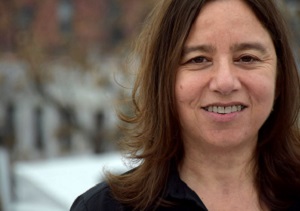De Amerikaanse schrijfster, historica en activiste Sarah Miriam Schulman werd geboren op 28 juli 1958 in New York City. Zij bezocht de Hunter College High Schoolen studeerde aan de Universiteit van Chicago van 1976 tot 1978, maar studeerde niet af. Zij heeft een Bachelor of Arts graad van het Empire State College. Schulman’s derde roman, “After Delores” uit 1988 kreeg een positieve recensie in de New York Times, en werd vertaald in acht talen, en werd in 1989 bekroond met een American Library Association Stonewall Book Award. Haar roman “Rat Bohemia” (1995) werd door Publishing Triangle uitgeroepen tot een van de 100 beste LGBT boeken. Voor “Stagestruck: Theatre, AIDS, en de Marketing of Gay America (1998) ontving Schulman de Stonewall Book Award. In 2009 publiceerde zij ”Ties That Bind: Familial Homophobia and Its Consequences”. In 2013 volgde “The Gentrification of the Mind: Witness to a Lost Imagination”, dat werd genomineerd voor een Lambda Literary Award. Schulman werd door Publisher Weekly uitgeroepen tot een van de 60 meest onderschatte schrijvers. Schulman was onder meer actief in de Women’s Union en The Committee for Abortion Rights and Against Sterilization Abuse (CARASA) In 1987 richtte Schulman en filmmaker Jim Hubbard het New York Lesbian en Gay Experimental Film Festival op, tegenwoordig MIX geheten. In 2001 richtten Schulman en Hubbard ook nog het ACT UP Oral History Project op. In de periode 1979-1994 werden 15 toneelstukken van haar geproduceerd in het kader van de avant garde “Downtown Arts Movement”, gevestigd in de East Village van New York. In 2009 schreven Schulman en Cheryl Dunye het script voor Dunye’s film “The Owls”. De film beleefde zijn wereldpremière op het internationale filmfestival van Berlijn in januari 2010. Daarna schreef het duo een X-rated film “Mommy Is Coming”, die in Duitsland werd geproduceerd door Jürgen Brüning en geselecteerd werd voor het Berlijnse Internationale Filmfestival van 2012. Schulman werkt tevens als Distinguished Professor of Humanities aan het College of Staten Island (CSI) en als Fellow aan het New York Institute for the Humanities.
Uit: The Gentrification of the Mind: Witness to a Lost Imagination
“The first gay book I ever saw was called Cylce Suck. It was on a shelf at The Oscar Wilde Bookstore on Christopher Street in 1975, next to some mimeographed pamphlets with titles like “The Woman-Identified Woman.” From the beginning, I have always known that this is as it should be. Separating distinctions between the sexually explicit and the politically necessary would never made sense. Yet, as I am writing this in 2009, a scandal erupts- first on-line, and then in the mainstream print media. Amazon.com, the mail order bookseller mega-monster, got caught in what they called a “glitch.” In response to right-wing and Christian readers, they removed books with sexual content from their ranking system, thereby ensuring that erotic and pornographic books would not be able to get on best-seller lists. Either deliberately or inadvertently, gay and lesbian books were included in the ban, and so were automatically removed from the Amazon ranking system. This included some editions of all of my books. The response of the gay community was tepid at best. A number of spokespeople called upon by the mainstream media, or speaking out on Facebook and various blogs were “shocked” and “outraged” (see above responses to the passing of Proposition 8.) They couldn’t believe this was happening to them. The event was treated as an anomaly, irregular and extreme. When it was made clear that these exclusions included James Baldwin novels, the outrage grew. How could “literature” be confused with pornography?
For me, Amazon’s actions were consistent with the way gay and lesbian literature has been contextualized in the United States. It is the surprise of some gay people, and the pretend “mistake” of a media/industry that consistently marginalizes our work as a matter of course, that constitutes the gentrified approach. As disenfranchised people often do the dirty work of the culture, we – gay, lesbian, bisexual (not yet transgendered- but that phenomena is inevitable) writers- gentrify ourselves. In the past, power brokers would not pretend that gay books were included when they are in fact excluded, and therefore susceptible gay people would not think that their work was included when it was in fact demeaned. The public explanation has changed, but the reality remains the same. The truth – that queer sexually truthful literature is seen as pornographic, and is systematically kept out of the hands and minds of most Americans, gay and straight- has been replaced with a false story of a non-existent integration and a fantasized equality, with no basis in lived fact.”

